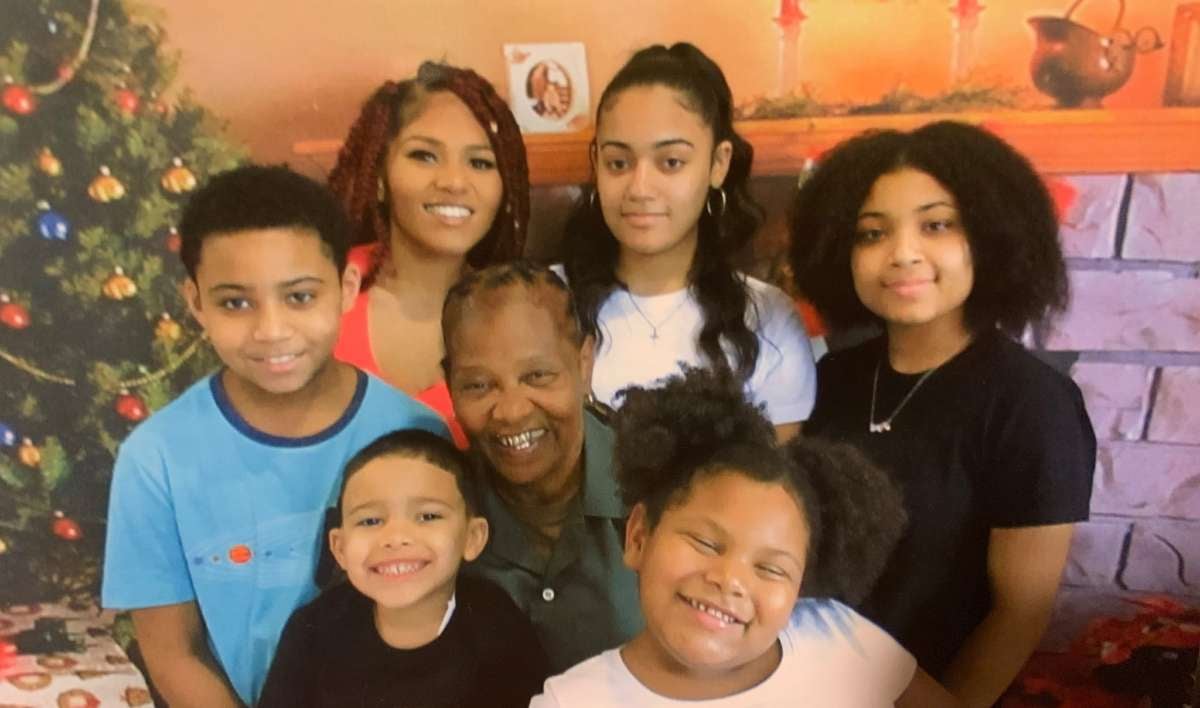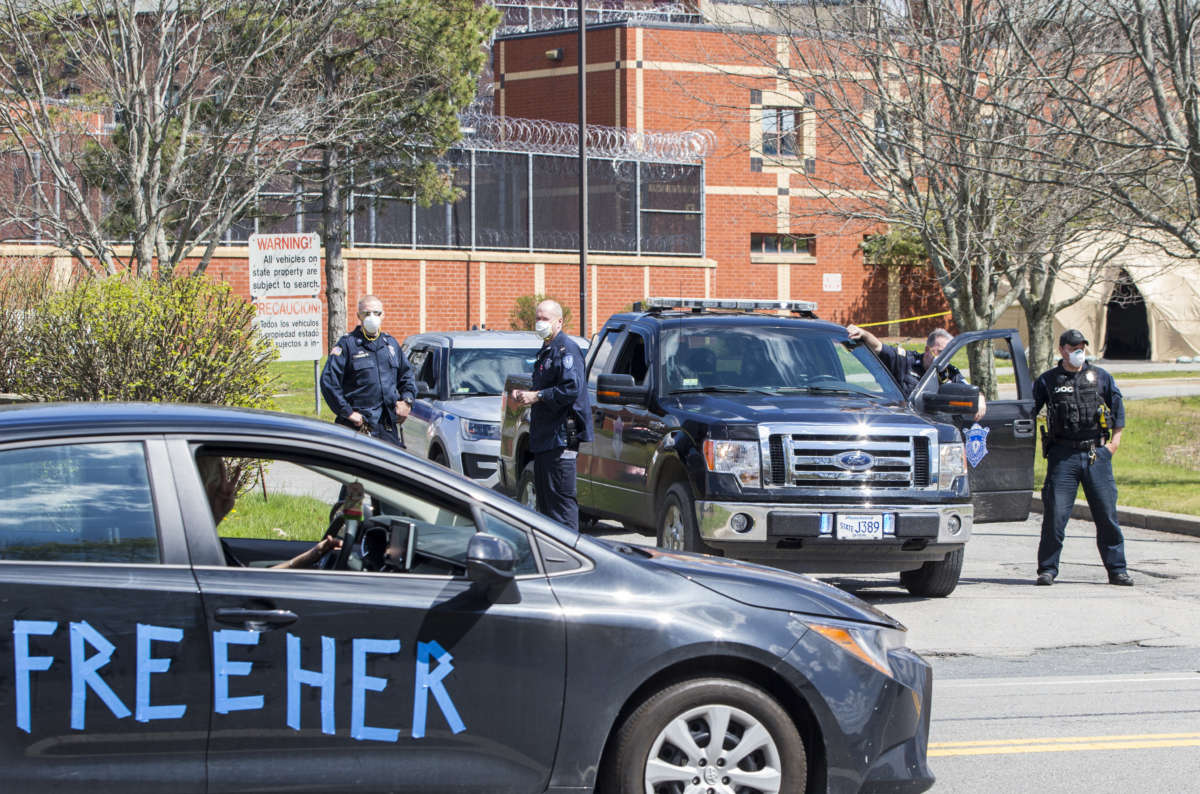Part of the Series
Despair and Disparity: The Uneven Burdens of COVID-19
Honest, paywall-free news is rare. Please support our boldly independent journalism with a donation of any size.
When COVID entered the federal medical prison in Carswell, Texas, it ballooned within weeks — of the 1,288 people tested, 504 were positive. In one housing unit of 300 women, only 26 women tested negative, including 56-year-old Sandra Shoulders.
Shoulders has severe diabetes, respiratory problems, and, since entering prison in 2015, chronic kidney disease, leaving her at only 30 percent kidney function. All of these make her more vulnerable to becoming debilitated, if not dying, from COVID.
Meanwhile, the prison’s practices discourage people from getting tested for COVID. “Even when inmates feel ill now, they are so scared of those conditions to speak up,” Shoulders explained. She described how those who tested positive were treated: “You are held in a room, and expected to wear the same set of clothes for 21+ days, without laundry facilities. Food is dropped by the door and physically kicked into the room by the guards.”
COVID policies have also curtailed access to medical care for other problems. Shoulders is supposed to see a kidney specialist quarterly; she has only seen him once this year. Now, she says her diabetes and kidney disease have caused swollen feet; a slipped disc causes persistent backaches. She lives in constant pain.
After Congress passed the Coronavirus Aid, Relief and Economic Security (CARES) Act, Attorney General William Barr issued a memo to the Bureau of Prisons (BOP), the agency responsible for federal prisons, expanding the criteria under which to release people to home confinement to stem the spread of COVID. The expanded criteria prioritize people whose age or health makes them vulnerable to COVID, as well as those in low- and medium-security prisons, people whose reentry plans show that they are less likely to contract COVID if not incarcerated, and people with low risk-assessment (or PATTERN) scores.
In August, a prison case manager said that Shoulders qualified for home confinement on September 25. Elated, she began making plans to join her godsister in Chicago. She also planned to reconnect with her three children and her 16 grandchildren, some of whom she only knew through photos and video calls.

Three weeks later, prison administrators told Shoulders that the BOP’s Central Office had denied her release. She was not told why. “I had to call my family and give them this heartbreaking news,” Shoulders told Truthout. The news not only left her reeling, but sent Shoulders — who has bipolar disorder, an anxiety disorder and obsessive-compulsive disorder — into what she calls a “serious mental health crisis and meltdown.”
“To have been so close to being home, and safe, and to have that taken away — not just from me, but from my family and church community — was too much for me,” she wrote. “I am emotionally and spiritually broken at times.”
On the heels of that devastating news comes the skyrocketing COVID rate in Texas. The week before Thanksgiving, Texas had an average of 11,725 cases per day. Tarrant County, where the prison is located, had an average of 1,437 cases per day or 68 of every 100,000 residents. According to the Georgia Institute of Technology, a gathering of 10 people in that county poses a 26 percent chance that at least one person has COVID. Authorities reported 3,356 new cases from the Thanksgiving weekend.
Chicago’s COVID rate is even higher, at 6,033 cases per day (or 65 of every 100,000 residents) for the city alone, but if she returned home, Shoulders would be able to abide by social-distancing guidance; she would no longer be involuntarily exposed daily to 299 other women and staff members who enter and leave the prison.
The same pattern has been playing out in federal prisons across the country. Though the Bureau of Prisons has 8,034 people on home confinement as of December 2, many in federal prisons report experiencing a similar runaround as Shoulders. At the same time, COVID has been surging in prisons across the country. As of November 20, there were 197,659 confirmed cases in prisons, a figure not including jails, juvenile detention or military prisons. The federal prison system has the second-highest COVID rate with 22,203 cases and 152 COVID-related deaths. (The Texas state prison system has the nation’s highest COVID rate.)
Release Denied With No Explanation

In July, 41-year-old Jessica Antunez requested to be transferred from the Federal Correctional Institution (FCI) Dublin in California to a federal prison camp (or minimum-security prison). She served nearly 14 years of a 20-year mandatory minimum sentence and was eager to go to a minimum-security prison, where she has a better chance at early release.
That was when prison staff told her that she was eligible for early home confinement under the CARES Act. Antunez is diagnosed with asthma and obesity, both of which increase her risk of severe illness if she were to contract COVID-19. She was elated, but also wary.
She began the paperwork and was approved to be released to her 19-year-old daughter’s home. She dreamed of cooking for her three children, listening to them without the seven-minute time limits of prison phone calls, and building new memories, especially with her youngest daughter, who was three when Antunez was arrested and has no memories of her outside of prison.
In September, however, prison staff told Antunez that her release had been denied. Like Shoulders, she was not given a reason.
“I have done every day of this sentence with hopes that I am going home sooner than later,” Antunez told Truthout. “I have always kept my family in high spirits about a new law maybe cutting my time short or the chances of clemency or whatever is going on in the system that may bring me home sooner, and when the door slams shut, it affects them just as hard or maybe even harder than me. But what hurts my heart most and absolutely breaks my interior is that I can’t even soften the blows with a hug or a phone call because I don’t have the privilege of using the phone when I need or want to.”
“No One Is Getting Released Anymore”
In April, Jessica Brown was one of several women at FCI Tallahassee who were told that they qualified for early release to home confinement. Brown, age 44, has asthma and hypertension and is clinically obese, thus qualifying her to finish the remaining three years of her nine-year sentence under home confinement.
In May, she signed paperwork to be released to Benevolence Farm, a reentry farm program near the homes of her parents and sister. From there, she could work on rebuilding her life and regaining custody of her four children, now living with their paternal uncle.

In September, however, prison administrators said Brown’s release had been denied. The decision was not because, shortly after being sentenced to five years in prison, Brown had cut off her electronic monitor and fled to Canada with her four children, whom, she says, she hoped to leave with her fiancé rather than relinquish to foster care in the U.S. (She was given an additional four-year sentence for her escape.) Instead, the denial was because a halfway house clinical director had said that Brown lacked risk factors for COVID-19. She was not even being released to a halfway house — she was being released to the reentry farm — and yet, according to Brown, the director’s determination resulted in the cancellation of her release. She received no information on which halfway house had supposedly denied her. She was told to contact the prison’s temporary medical director. She sent him four messages but received no response.
On October 1, her housing unit was placed on lockdown after 11 women tested positive. Overall, 123 of 674 people have tested positive at FCI Tallahassee since the pandemic began. Meanwhile, Brown waits for a response and hopes she doesn’t get sick.
Others at FCI Tallahassee have also been told that they qualified for early release only to be told later that they were “too healthy” to qualify. “No one is getting released anymore,” Brown told Truthout.
Will 16 Months Become a Death Sentence?
“That is true, no one is getting released,” agrees Cydra Alexander, also at FCI Tallahassee, with 16 months left to serve.
When the CARES Act passed, the 35-year-old asked about home confinement. Alexander is, in her words, overweight, a condition that increases her risk of severe illness if she contracts COVID-19. Her housing pod consists of nearly 100 women. “We don’t even sleep six feet apart,” she told Truthout.
Alexander is not a biological parent, but until her incarceration, was raising her niece. She is eager to reunite with her niece as well as help her parents, now in their sixties. She hoped to be able to help them around the house and, if the terms of home confinement permitted, grocery shop and run errands. And she would be there in person when the anniversary of her older brother’s 2015 death rolled around in January. “It’s a hard time for the family around this time of year,” she said.

However, prison officials told her that she did not qualify until she had served over 50 percent of her 70-month sentence; by April, Alexander had served 33 months.
Alexander applied again in September, having served over half her sentence. In October, her request was denied. “I am very worried [about COVID],” she wrote. “Several units have been closed down due to having positive cases.” On two separate occasions, her unit was locked down after two women tested positive.
Alexander now has 16 months left to serve. “I could lose more family before I get home,” she worries. “I could even catch COVID and not make it to my family.”
Ill, in Isolation and Denied Release
In April, 57-year-old Kim Earlycutt began feeling feverish and, even after bundling up in two pairs of pants, two pairs of socks, a sweatshirt and coat, could not get warm. She couldn’t hold any food or liquids down. After four days, she sought medical care. The nurse took her temperature; it was 103 degrees.
“I was put in SHU [solitary confinement] for 14 days,” she told Truthout. On her second day in isolation, she was given Tylenol. On the third day, after her fever subsided, she was placed in a quarantine area with 26 other people, some of whom were quarantining before release and some of whom were beginning quarantine for being sick. Only then was she was tested for COVID; her test came back negative.
In May, her prison case worker said that she qualified for early release under the CARES Act. Earlycutt, who has chronic obstructive pulmonary disease, heart problems, severe asthma and latent tuberculosis, was thrilled to hear she would be rejoining her family earlier than expected. In October, however, she received a denial.
Unlike the other women, Earlycutt’s denial came not from Central BOP headquarters, but from the prison’s warden and case management coordinator, who said that she needed a minimum rather than low PATTERN (risk assessment) score for recidivism. (Barr’s March memo instructs BOP officials not to prioritize those with a score above minimum.) Now, instead of spending the holidays with her children and grandchildren, she must wait until 2025 to rejoin them.
A Catch-22
Lazara Ordaz will turn 62 on December 17. She has spent 22 years in federal prison on a 35-year sentence for conspiracy to distribute cocaine.

Ordaz is incarcerated at FCI Coleman in Florida, where 265 of 1,146 women have tested positive. She was told that she qualified for home confinement because of her age, thyroid condition and high blood pressure. Her case manager began processing her paperwork, but then stopped because Ordaz, who came to the U.S. from Cuba in 1980, has an immigration detainer from Immigration and Customs Enforcement (ICE) that goes into effect upon her release date.
In 2017, Cuba agreed to start accepting people deported from the U.S. Sixty-four people were deported from the U.S. to Cuba in 2018 and another 1,179 people in 2019. But not every person convicted of a felony is automatically deported; when Ordaz’s brother (and co-defendant) was released from prison in 2019, he spent two months in an immigration detention facility and was then released to rejoin his family in the U.S. Ordaz is hoping for a similar outcome.
Ordaz’s immigration status landed her in a catch-22. Prison administrators told Ordaz that they could continue the process if she could obtain a “no-action” letter from ICE. She had previously received one in 2017 while at the federal prison in Alabama. However, ICE officials in Florida have refused to issue a no-action letter while she was in BOP custody.
Ordaz questions the point of her continued imprisonment. “I know the harm I caused to a lot of people,” she wrote. “I know I need to pay for what I did, but if you don’t learn [after] five to ten years, you never going to learn.” The offer of home confinement, she continued, “is the first time I tasted freedom and it was taken from me because of this detainer.”

These mothers — and many others behind bars — had pinned their hopes on the CARES Act, which would have allowed them to rejoin their families for the holidays and begin rebuilding their lives. Instead, they remain behind bars, hoping not to contract COVID.
“I want so desperately for the world — and U.S. lawmakers, including our new president, to understand that remaining in these prisons is a DEATH sentence,” Shoulders wrote from Carswell. “We are not immune to this disease forever, and we are packed in here like sardines, locked up inside seven days a week, with NO rehabilitative programming and scant religious services, just waiting to get sick.”
Press freedom is under attack
As Trump cracks down on political speech, independent media is increasingly necessary.
Truthout produces reporting you won’t see in the mainstream: journalism from the frontlines of global conflict, interviews with grassroots movement leaders, high-quality legal analysis and more.
Our work is possible thanks to reader support. Help Truthout catalyze change and social justice — make a tax-deductible monthly or one-time donation today.
